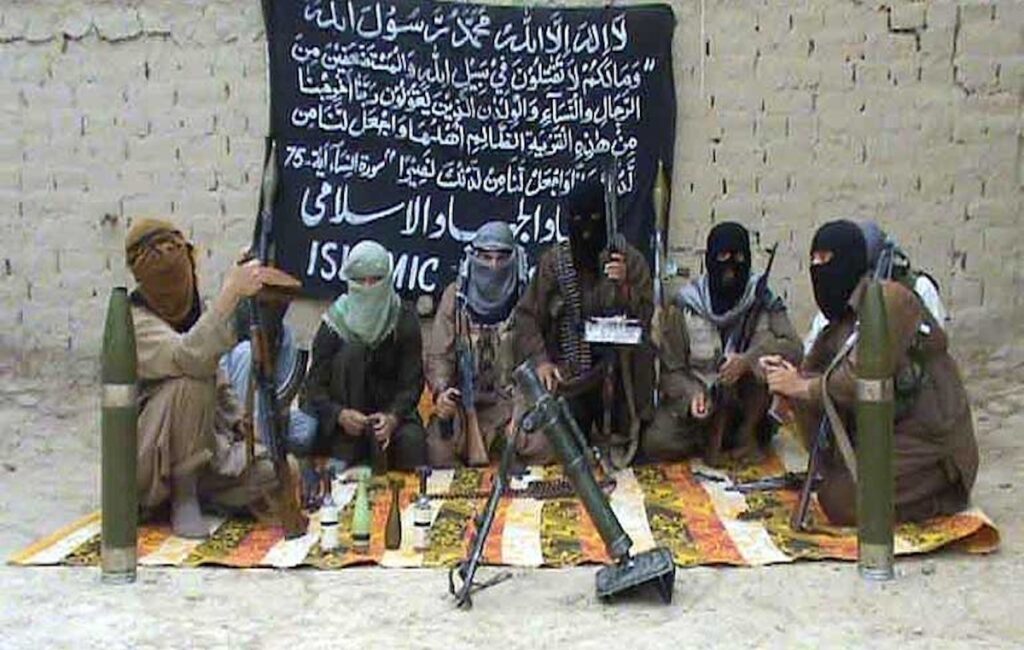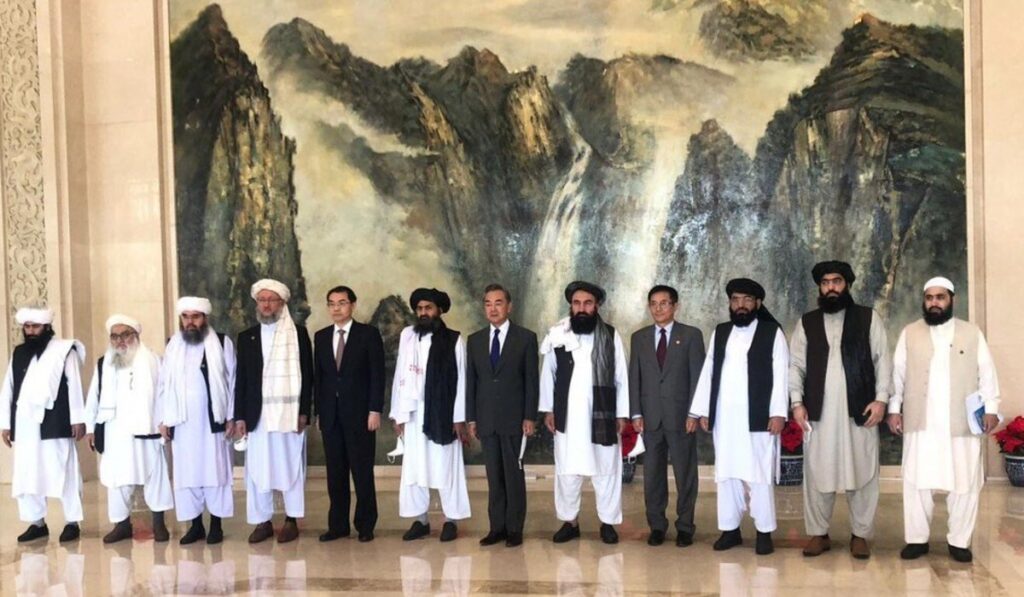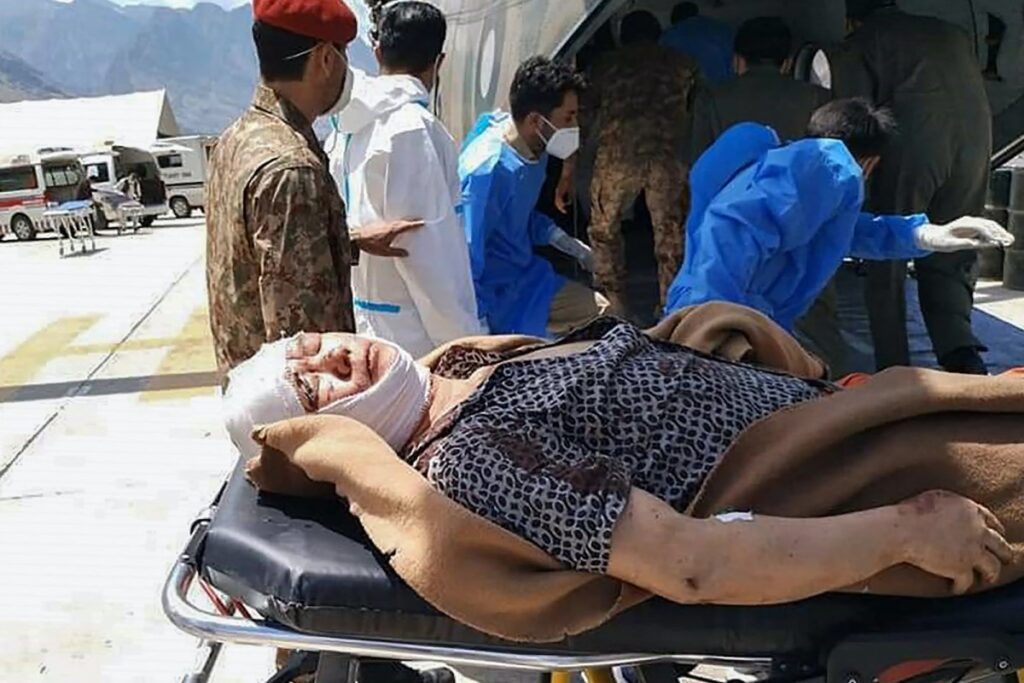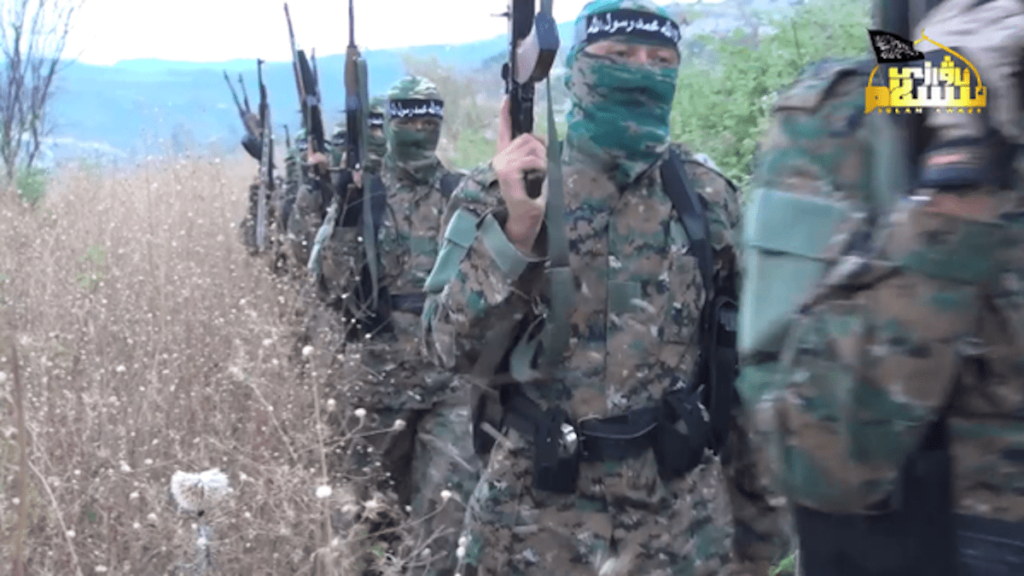Ethnic Uighur fighters with the East Turkestan Islamic Movement (ETIM) fly their flag in a file photo. Image: Facebook
PESHAWAR – China and Pakistan are pressuring the Taliban to make a clean break with the East Turkestan Islamic Movement (ETIM), Tehreek-e-Taliban Pakistan (TTP) and other terror groups, many of which have sanctuaries in the northeastern and southwestern parts of Afghanistan.
That pressure is building as certain of the groups launch new assaults on Chinese interests in neighboring Pakistan, including the US$60 billion China-Pakistan Economic Corridor (CPEC) project that Beijing seeks to extend to Afghanistan for greater Central Asian connectivity.
China sees the ETIM in particular as a “direct threat to its national security”, Foreign Minister Wang Yi told a Taliban delegation at a recent meeting. The militant group bent on destabilizing China’s western Xinjiang region is also a threat to China’s interests in Pakistan.
Beijing’s request to the Taliban came after a joint China-Pakistan investigation showed ETIM and TTP colluded in a July 14 bus bomb attack that killed nine Chinese engineers working on the CPEC-related Dasu hydropower dam project in Pakistan’s upper Kohistan region.
The attack, which used explosive-laden cars to ram into the bus which sent it hurtling down the side of a mountain, also killed two Pakistani security officials and two others.
The ETIM, comprised of ethnic Uighurs and categorized by the UN and others as a terror organization, is committed mostly to destabilizing China’s Xinjiang region, which it has said it aims to turn into an independent state known as “East Turkestan.”
The Taliban is relying on various terror groups to make battlefield gains, seize territory and eventually take power from President Ashraf Ghani’s government in Kabul in the wake of America’s troop withdrawal.

ETIM fighters at an undisclosed location in a file photo. Image: Twitter
While the Taliban’s jet-setting leadership has vowed to cut ties with such outfits, hardline commanders in the field do not clearly share the sentiment.
Pakistan is known to have conveyed a warning to the Afghan Taliban, saying that global recognition of a potential Taliban-led government in Kabul will hinge on their cooperation in expelling foreign terror outfits from the areas under their control.
Afrasiab Khattak, a politician, intellectual, and Pashtun rights activist, told Asia Times that China’s hope that the Taliban will make a clean break from the ETIM is likely wishful thinking.
“Taliban haven’t done it on al-Qaeda, Islamic Movement of Uzbekistan (IMU), TTP, etc. Why would they do it on ETIM?,” Khattak said.
The ETIM and TTP moved to Afghanistan border areas from Pakistan’s mountainous region of North Waziristan following a Pakistan army operation known as Zarb-e-Azb in 2014. Other foreign and local terrorist outfits were also pushed into Afghanistan territory during the campaign.
The ETIM and TTP’s main leadership now have sanctuaries and enjoy logistical support in the northeastern and southwestern parts of Afghanistan where the Taliban rule.
Farhatullah Babar, a Pakistani leftist politician, former senator and spokesperson for the Pakistan People’s Party, told Asia Times that it was very unlikely that the Taliban would honor their commitments and desist from harboring foreign terror groups.
“China has drawn the line and the Taliban need to expel all terrorist groups who took shelter in the areas controlled by their forces. However, taking a cue from their previous record of breaking promises, they are unlikely to adhere to their commitments and promises,” he said.

Nine Taliban representatives meet with Chinese officials in Tianjin. In the center are Taliban co-founder Mullah Baladar and Chinese Foreign Minister Wang Yi. Photo: Chinese Foreign Ministry
Babar referred to a July 25 United Nations report that claimed al-Qaeda continues to operate under the Taliban’s protection in 15 Afghan provinces including Kandahar, Helmand and Nimruz. The Taliban had vowed as part of its February 2020 Doha agreement with the US to cut ties with the transnational terror group.
That disconnect between diplomatic rhetoric and on-the-ground reality reflects divisions between the Taliban’s Political Office, led by Abdul Ghani Baradar Abdul Ahmad Turk, and a more hardline group close to Sher Mohammad Abbas Stanekzai.
The former is leading the Taliban’s interactions with China, Pakistan and others, while the latter is in charge of rank-and-file fighters who reportedly do not see the upside of interacting with the international community and showing moderation – including by cutting ties with aligned battle-hardened groups like the ETIM and TTP.
Pakistan is paying a price for the Taliban’s unwillingness to crack down. Soon after the July 14 Dasu bus attack, Beijing postponed a high-level joint committee meeting for the Belt and Road Initiative (BRI) in Pakistan and halted work on the $1 billion Dasu hydropower project.
As Beijing ramped up pressure on Islamabad over the lethal incident, Pakistan sent a high-profile delegation to Beijing to assuage Chinese leaders and assure them that those involved in the attack would be apprehended and punished.
Pakistan’s Foreign Minister Makhdoom Shah Mahmood Qureshi and Director-General Inter-Services Intelligence (ISI) Lieutenant General Faiz Hameed flew to Beijing last week to share the findings of the joint investigation report. Pakistani authorities had initially claimed the explosion was caused by a mechanical malfunction, claims Beijing quickly contradicted.

Soldiers move from an army helicopter to a military hospital a Chinese national injured in a bomb attack on a bus in Gilgit, Pakistan, July 14, 2021. Photo: AFP
The incident was the latest in a series of militant attacks on Chinese installations and interests linked to the ETIM in Pakistan. The group has demonstrated exceptional staying power in Pakistan amid decapitations of its top leadership.
ETIM founder Hasan Mahsum, an ethnic Uighur from Xinjiang’s Kashgar region, was gunned down by Pakistani troops in 2003 during a raid on a suspected al-Qaeda hideout near the Afghanistan border.
Abdul Haq took over the militant outfit’s leadership and is believed to have orchestrated a 2007 ETIM attack on a Chinese massage parlor in Islamabad that captured three female Chinese technicians who the Islamic outfit claimed were involved in prostitution.
ETIM militants rushed to the Lal Masjid, or Red Mosque, for sanctuary after raiding the massage parlor. Beijing’s protest led to a Pakistani commando attack on the mosque, resulting in the killing of over 100 including 14 ETIM ethnic Uighur militants and the shrine’s deputy imam Abdul Rashid Ghazi. Haq was killed in a Pakistani assault in 2010.
In 2013, a video that showed children as young as six firing handguns, AK-47 assault rifles and machine guns at a training camp in Pakistan’s North Waziristan region operated by the ETIM went viral on Pakistan social media.
China protested over the video with Pakistani authorities, demanding that all ETIM-related training camps in Pakistan’s remote tribal areas be dismantled immediately. Beijing’s call motivated Pakistan’s military offensive against the militants in 2014, which pushed ETIM militants back into Afghanistan’s border region.
Pakistan Defense Minister Khawaja Asif, during a visit to Beijing in October 2015, triumphantly told his Chinese hosts that Pakistan had eliminated all members of the Uighur militant group from its territory.

ETIM fighters on the march in Afghanistan. Image: Facebook
Chinese state media released a report in August 2014 stating that Memetuhut Memetrozi, a co-founder of ETIM serving a life sentence in China for his involvement in terrorist attacks, had been indoctrinated in a madrassa in Pakistan.
The report, which claimed Memetuhut had met Mahsum in 1997 and launched ETIM later that year, marked a rare public admission of Pakistani ties to anti-China Uighur militancy.
A similar Chinese probe into a 2011 incident in Kashgar which left 20 dead and hundreds injured revealed that ETIM attackers wielding knives and bombs were found to have trained in Pakistan.
Post Disclaimer
Disclaimer: Taliban won’t readily cut ties with anti-China ETIM By FM SHAKIL - Views expressed by writers in this section are their own and do not necessarily reflect Latheefarook.com point-of-view